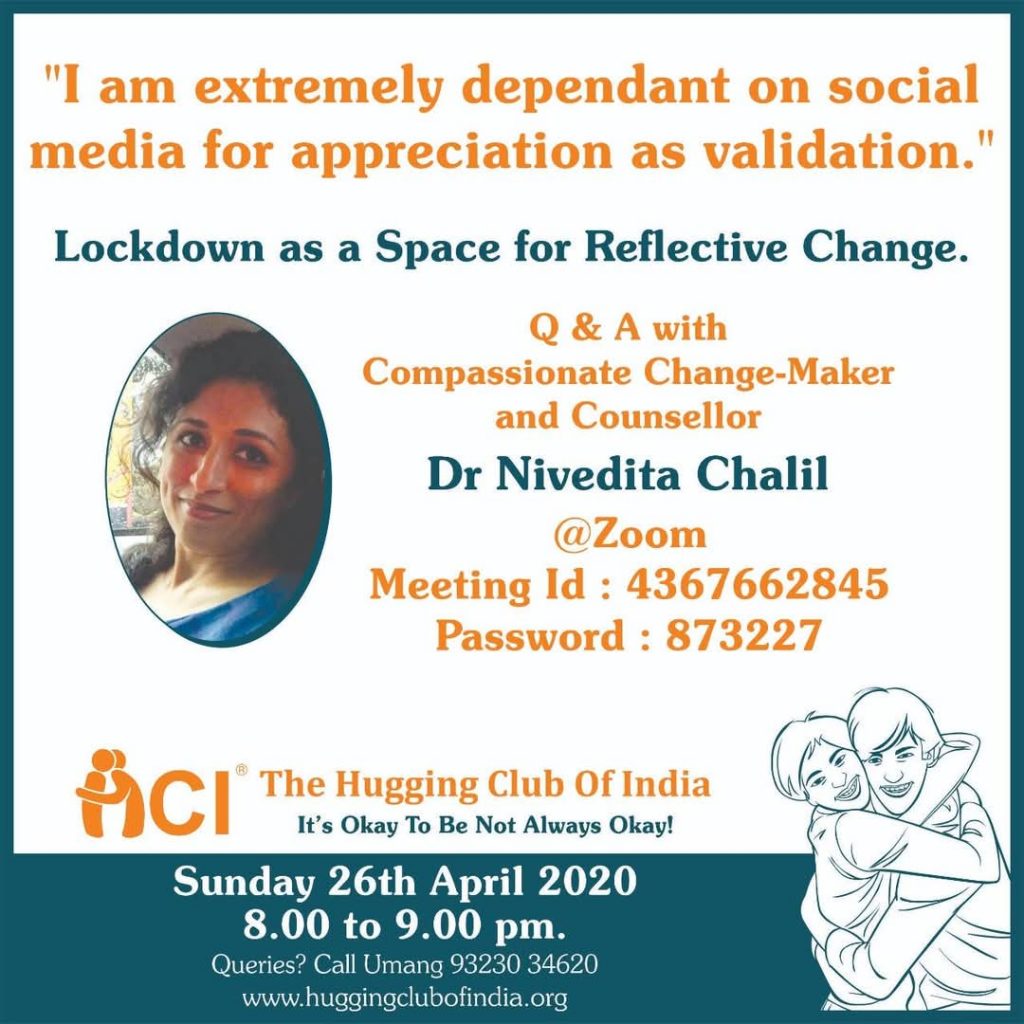Dr. Nivedita, a compassionate counselor and art-based therapist with a PhD in social work and a Master’s in Nalanda Buddhist philosophy is a beacon of positivity and interdependence. Her approach to mental health is deeply rooted in practical wisdom, emphasizing the need to move beyond conceptual understanding to embodying and practicing self-reflection and emotional regulation.

The talk, hosted by HCI (Hugging Club of India), focused on navigating mental health challenges during the lockdown, using the opportunity for deeper self-exploration and healing.
Key Themes and Insights
- Interdependence and Compassion
Dr. Nivedita’s life mission is to propagate interdependence, which she lives through her selfless actions—counseling abuse survivors, aiding disaster victims, and offering pro bono support. Her humility and accessibility make her a relatable figure, embodying the idea that true healing comes from interconnectedness. She teaches that what others think of us is beyond our control, a realization that can be liberating. Similarly, she advises against dwelling on insults or rudeness, urging people to either forgive, show compassion, or address the issue directly without prolonged emotional suffering.

- Emotional Awareness During Lockdown
The session began with an interactive exercise where participants shared one-word feelings about the lockdown. Responses ranged from “boredom” and “loneliness” to “opportunity” and “self-exploration,” highlighting the spectrum of emotions people experienced. Dr. Nivedita introduced the “emotion wheel,” illustrating six root emotions—fear, anger, sadness, surprise, joy, and love—and their nuances. She emphasized that while everyone desires to stay in the “joy” or “love” zones, external stressors often trigger negative emotions, creating mental turbulence.
- The Clap Metaphor: External vs. Internal Factors
Using the metaphor of a clap, Dr. Nivedita explained that suffering arises from the interplay of external situations (e.g., conflicts, isolation) and internal mental states. Just as a clap requires two hands, emotional reactions depend on both external triggers and internal perceptions. For instance, an air-conditioned room feels pleasant initially but uncomfortable later due to changes in internal state (e.g., body temperature). This analogy underscores the importance of recognizing and regulating internal responses, especially when external circumstances (like lockdowns) are uncontrollable.

- Self-Reflection and Compassion
Dr. Nivedita stressed that meaningful change begins with self-reflection, but this must be approached with self-compassion. Judgmental thoughts (“I goofed up again”) hinder growth, while neutral observations (“Was this helpful?”) foster clarity. She shared her own journey of managing anger by recognizing thought patterns and consciously shifting focus to positive aspects of relationships. The goal is not to suppress emotions but to understand their roots and choose responses that align with well-being.
- Practical Tools for Emotional Stability
- Pause and Reflect: When upset, identify the external trigger and your internal state. Ask, “Is my reaction helpful?”
- Shift Perspectives: Replace negative loops with balanced thoughts (e.g., “This person also has good qualities”).
- Embrace Imperfection: Accept that self-improvement is gradual. Avoid self-criticism during the process.
- Use the Lockdown as an Opportunity: With fewer external distractions, focus on “mind safai” (mental decluttering) to build resilience.

Conclusion
Dr. Nivedita’s session was a powerful reminder that while external challenges are inevitable, our internal responses determine our emotional well-being. By cultivating self-awareness, compassion, and practical tools, we can navigate difficulties like the lockdown with greater stability and even growth. Her teachings, drawn from Buddhist psychology and lived experience, offer a roadmap to emotional freedom—one clap (or one mindful step) at a time.
- Written by Aniket Kundu
